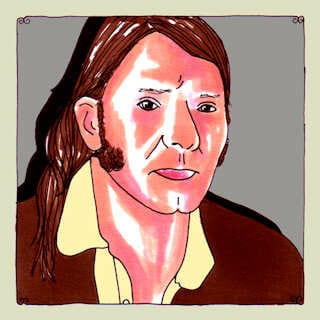- Welcome to Daytrotter
- Blue Flame
- Gamblin’ House
- Goodtimes
- You Don’t Come See Me Anymore
Some people, you’d like to be. You would, at least temporarily, love to remove yourself from your life, slip out of your clothing and skin and become someone else because of the enjoyment that you think you’d get out of the swap. These people are normally celebrities and those worth more money, owning more things than anyone really has any business owning. It’s the fantasy existence, the allure of it, that makes such an impossible trade relatively desirable. The excitement would just overwhelm you and perhaps you’d not want to go back after having been totally transformed – soul and problems and all into this other mystery person – or it would be just the opposite. The time spent being someone else would have been just enough before the need to get back into your own suit of organs and to have all of the wires and telegrams of your own head getting relayed to all of those old parts would take over. And there are so many people out there to emulate, to envy – not in a deadly sins sort of way, but in a way that’s mostly about curiosity and discovery – that it may even feel like this impulse is ever-present. But then there are men like Malcolm Holcombe, whom you can admire and be awed by, but you’d never once want to trade places with him. The kinds of demons and pains that one would be inheriting in doing such an ill-advised trade would be staggering. He’s got full kingdoms of goons and lucifers stalking through his heavy heart, his hardened hands and his darkened head. They’re grim and they’re persistent, reminding him over and over again about what he will have to take with him wherever he goes. No light and no love could ever replace what he’s known, seen and felt in his many decades of tragic life. Holcombe’s life story is one full of great sadness and despair. It’s wickedly defined by soul-breaking deaths and mind-whirring, serrated depression that is nothing if it’s not justified. He’s had so many parts of his cheer and his spirit brutally destroyed that it’s a wonder how he’s gotten through it all. His close friends in the Asheville, N.C., area where he lives, believe that the songs he writes – over-flowing with his tales of vices, pain, and a hopelessness that’s almost become something akin to strength shaken out of him by a deep and whiskeyed voice – are therapy, ways to cut those devils off at the knees even if they can grow new legs by the morning. Holcombe gives grief so much personality. He lets it get its exercise, but he only gets consumed by it to a point. He’s been consumed by it before and some of his songs are still just the ironing out those times, when it all was broken, drab and full of time that just needed to be remembered in a different way. He sings about loneliness in such a way that we’re attracted to it – to that very beastly feeling of heartbreak and empty, empty space. “You Don’t Come See Me Anymore,” is a breathtaking song where Holcombe, in his quavering way, with a patience for burns, the scars and black smoke, sings about people leaving and giving up on other people, just leaving them standing there shiftless and lost. He sings, “My hands fill up my pockets, keepin’ time,” just grabbing onto the jangling keys in his pockets for some cold solace that doesn’t ever really come.
